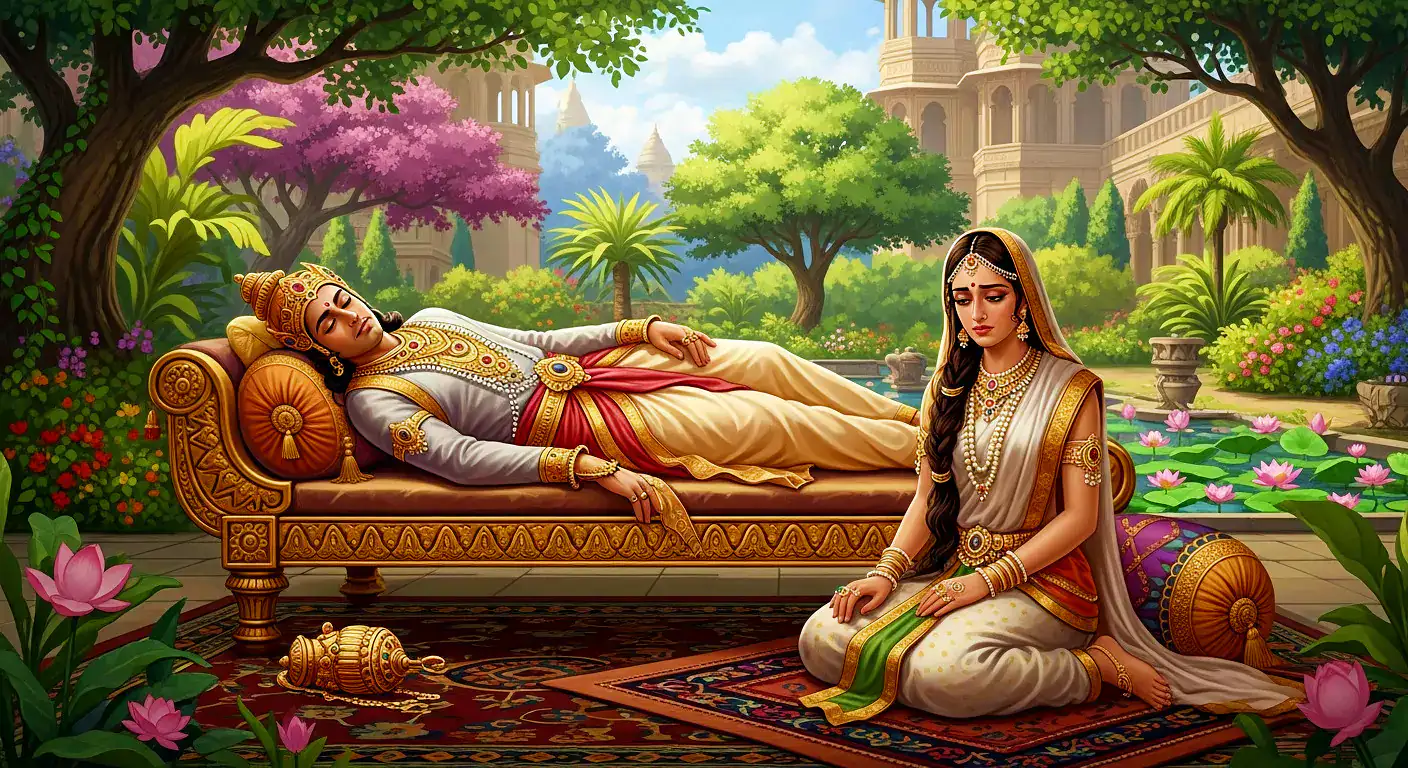MAHA SUDASSANA JĀTAKA
-
Save
This story was told by the Master as he lay on his deathbed, concerning Ananda’s words: “O Blessed One, suffer not your end to be in this sorry little town.”
“When the Buddha was dwelling at Jetavana,” thought the Master, “the Elder Sariputta, who was born in Nala village, died at Varaka in the month of Kattika, when the moon was full; and in that selfsame month, when the moon was on the wane, the great Moggallana died. My two chief disciples being dead, I too will pass away, in Kusinara.” So thought the Blessed One; and, coming on his alms-pilgrimage to Kusinara, there upon the northern bench between the twin sal-trees he lay down never to rise again.
Then said the Elder Ananda: “O Blessed One, suffer not your end to be in this sorry little town, this rough little town in the jungle, this little suburban town. Shall not Rajagaha or some other great city be the death-place of the Buddha?”
“Nay, Ananda,” said the Master, “call not this a sorry little town, a little town in the jungle, a little suburban town. In bygone days, in the days of Sudassana’s universal monarchy, it was in this town that I had my dwelling. It was then a mighty city, encompassed by jewelled walls twelve leagues around.”
Therewithal, at the Elder’s request, he told this story of the past and uttered the Maha-Sudassana Sutta.
Then it was that Sudassana’s queen, Subhadda, marked how, after coming down from the Palace of Truth, her lord was lying upon his right side on the couch prepared for him in the palm-grove, which was all of gold and jewels—that couch from which he was not to rise again. And she said, “Eighty-four thousand cities, chief of which is the royal city of Kusavati, own your sovereignty, sire. Set your heart upon them.”
“Say not so, my queen,” said Sudassana; “rather exhort me, saying, ‘Keep your heart set upon this town, and yearn not after those others.’”
“Why so, my lord?”
“Because I shall die to-day,” answered the king.
In tears, wiping her streaming eyes, the queen managed to sob out the words the king bade her say. Then she broke into weeping and lamentation; and the other women of the harem, to the number of eighty-four thousand, also wept and wailed. Nor could any of the courtiers forbear, but all alike joined in one universal lament.
“Peace!” said the Bodhisatta; and at his word their lamentation was stilled. Then, turning to the queen, he said: “Weep not, my queen, nor wail. For even down to a tiny seed of sesamum, there is no such thing as a compound thing which is permanent; all are transient, all must break up.”
Then, for the queen’s behoof, he uttered this stanza—
How transient are all component things!
Growth is their nature and decay:
They are produced, they are dissolved again:
And best it is when they have sunk to rest.

-
Save
In this connection, things are impermanent, good Queen Subhaddā. However many causes of whatever kind have come together—such things as the constituent parts and the sense spheres—all are processes, and all of them are certainly impermanent. Of these, form is impermanent, feeling is impermanent, perception is impermanent, processes are impermanent, and consciousness is impermanent.
The eye is impermanent, and so are forms. The ear is impermanent, and so are sounds. The nose is impermanent, and so are odours. The tongue is impermanent, and so are tastes. The body is impermanent, and so are touches. The mind is impermanent, and so are thoughts. Whatever treasure there is, whether with consciousness or without consciousness—all of that is impermanent. Thus grasp this: “All things are impermanent.”
Why? Their very nature is arising and decay. All of these have the nature of arising, and they also have the nature of decay. Their natural state is to come into being and to break up; therefore they are impermanent, and thus it should be understood.
Since they are impermanent, after arising they cease. After arising and persisting, they cease. All of these, coming into being, are called arising; breaking up, they are called ceasing. When they arise, they certainly persist; when they persist, they certainly break up. There is no persistence without arising, and there is no persistence without ceasing.
Thus all things, having these three characteristics, right there and then cease. Therefore they are impermanent—momentary, transient, inconstant, fragile, unstable, shifting, non-lasting, ever-moving, temporary, without essence, like an illusion, a mirage, or bubbles. Being temporary, how could the perception of happiness arise in them, good Queen Subhaddā?
Understand it thus: the stilling of them is happiness—the stilling of all the rounds of birth and death. This stilling is called Nibbāna. From this one thing there is true happiness; from anything else there is not what is rightly called happiness.
Thus did the great Sudassana lead his discourse up to ambrosial Nibbāna as its goal. Moreover, to the rest of the multitude he gave exhortation to be charitable, to obey the Precepts, and to keep hallowed the fast days. The destiny he won was to be reborn thereafter in the Realm of Devas.
His lesson ended, the Master identified the Birth, saying: “The mother of Rahula was the Queen Subhadda of those days; Rahula was the king’s eldest son; the disciples of the Buddha were his courtiers; and I myself was the great Sudassana.”
Source : 1) The Jataka ,Vol 1, trans. by Robert Chalmers, 2) Jataka Attha Kata
